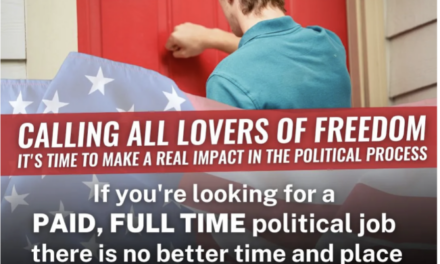We support our Publishers and Content Creators. You can view this story on their website by CLICKING HERE.

Vice President Harris received broad, bipartisan criticism for the price control scheme she recently proposed on everything from groceries to rent. Even the Washington Post Editorial Board has denounced her plan, calling it “full of gimmicks.” This disparagement is understandable as the plan appears to be a cheap political effort to deflect blame for her administration’s high inflationary policies. With the price of food and rent sky high, voters are angry, and the only excuse of an explanation that Harris could cobble together is that it’s our food suppliers’ and landlords’ fault and that the government needs to tell them what they can and can’t charge.
Advertisement
Throwing socialism down all our throats, seemingly just so that she can blame someone else for the Biden-Harris administration’s policy mistakes, is as close to the encyclopedia definition of “corrupt authoritarian” that we’ll see in this country.
However, there is one pricing restraint that Harris recently went out of her way to say she won’t support as president. Naturally, it’s one that one of the political arena’s top donor groups is lobbying aggressively to kill.
That lobbying group is Big Pharma, and it’s pushing to have the government eliminate the private sector groups that American businesses hire to stop the drugmakers’ price-gouging.
The long and short of it is that American companies don’t have the power to take on the big drug companies by themselves, so the vast majority of them hire negotiating agents known as pharmacy benefit managers (PBMs) to manage their health plans and secure cheaper costs with the drug manufacturers.
However, even though Haris is all about restraining prices, she doesn’t seem to want the private sector to be able to limit cost increases in the healthcare industry. In late August, she announced that, if elected as president, she would regulate the PBM groups that American businesses use to secure cheaper drugs for their employees.
Recommended
Advertisement
Of course, crushing this Big Pharma pricing restraint—a restraint that currently processes 90% of Americans’ prescription drug claims—will cost consumers massively. President Trump’s top economic advisor found that these PBM groups save us over $140 billion annually. The independent, nonpartisan Government Accountability Office found that they decreased Medicare’s prescription drug plan costs by a full 20% in just one year.
Kamala would prefer that the Big Pharma companies pocket all that money. Yet, she dares to say on the campaign trail that she’s leading the fight against Big Pharma.
Really, madam vice president? Big Pharma is spending millions upon millions of dollars in Washington pushing lawmakers to do exactly what you promise to do if elected. Yet, you contend that you are the drugmakers’ biggest enemy? Give us a break. While Harris has come out in favor of more government controls on drug costs, her proposal is a gift to Big Pharma, not a setback. The drug companies would much rather have their friends in government — the same politicians they shower with campaign contributions — “negotiate” pricing than they would the independent private businesses that Kamala wants to regulate away.
Private sector negotiators are vested in lowering prices for the businesses that pay them. By contrast, the government is interested in helping its political donors and beneficiaries.
Advertisement
The National Community Pharmacists Association, a group with sharp ties to the drug companies, thanked Kamala for calling for these PBM regulations and called on Trump to do the same. Let’s hope that the former president, who once said, “Too often our public health establishment is too close to Big Pharma” and that “Big Pharma puts profits above people,” shouldn’t follow her lead.

 Conservative
Conservative  Search
Search Trending
Trending Current News
Current News 




